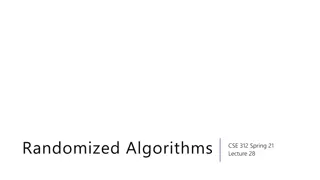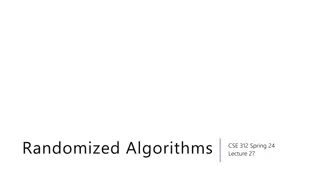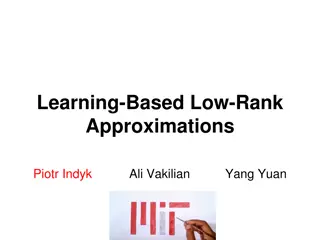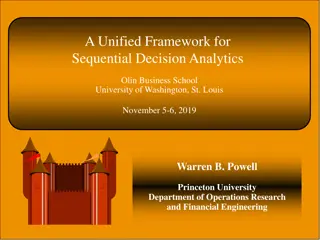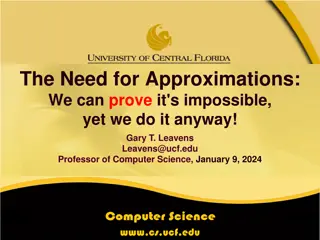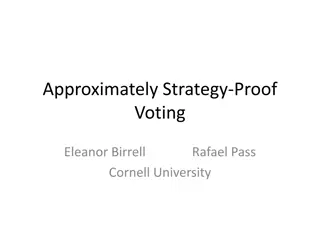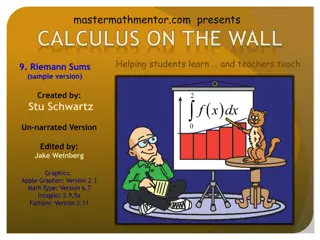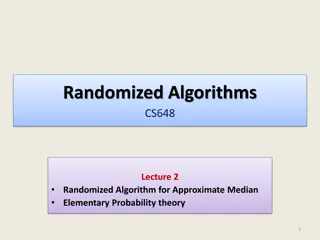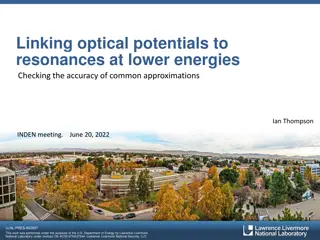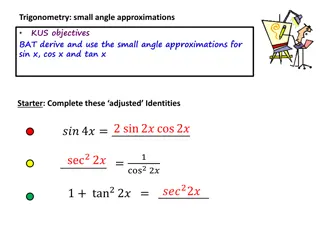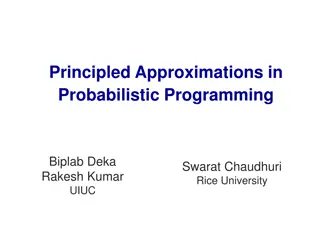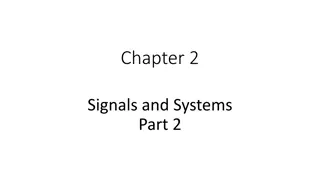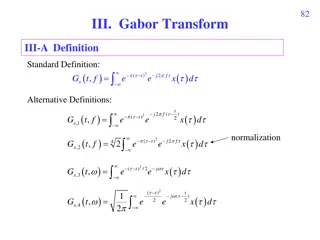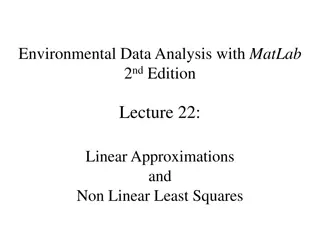Randomized Algorithms: Types and Examples
Explore the world of randomized algorithms through types like Las Vegas and Monte Carlo, with a focus on classic examples such as Quick Sort. Learn how randomness plays a crucial role in computation and discover the principles behind these algorithms. Dive into the applications of randomized algorit
3 views • 22 slides
Randomized Algorithms: A Deep Dive into Las Vegas and Monte Carlo Algorithms
Randomized algorithms incorporate randomness into computations, with Las Vegas algorithms always providing the correct answer but varying in time, while Monte Carlo algorithms occasionally give wrong answers. Quick Sort is a classic Las Vegas algorithm that involves pivoting elements for sorting. Ch
7 views • 21 slides
Learning-Based Low-Rank Approximations and Linear Sketches
Exploring learning-based low-rank approximations and linear sketches in matrices, including techniques like dimensionality reduction, regression, and streaming algorithms. Discusses the use of random matrices, sparse matrices, and the concept of low-rank approximation through singular value decompos
3 views • 13 slides
Sequential Decision Analytics Framework Overview
This content discusses a unified framework for sequential decision analytics presented at Olin Business School, University of Washington. Topics include guidelines for choosing policies, policy function approximations, cost function approximations, value function approximations, and direct lookahead
3 views • 11 slides
The Need for Approximations in Computer Science
Exploring the concept of approximations in computer science, despite the inherent challenges in proving them, as discussed by Professor Gary T. Leavens. The content covers the background of problems and algorithms, defining effective procedures through examples and intriguing programs. Delve into th
5 views • 34 slides
Strategy-Proof Voting: Approximations and Possibilities
Explore the concept of approximately strategy-proof voting through models and constructions, aiming to prevent manipulation while ensuring fair outcomes. Discuss the challenges and potential methods to circumvent manipulations based on Gibbard-Satterthwaite theorems. Delve into defining approximatio
5 views • 11 slides
Riemann Sums and Area Approximations in Calculus
Explore the concepts of Riemann sums, different types of approximations like left, right, and midpoint sums, trapezoidal rule, and interpreting area in real-life scenarios with examples. Learn how to apply these methods to approximate irregular areas and calculate distances and average speeds. Dive
4 views • 6 slides
Randomized Algorithms for Approximate Median with Elementary Probability
This content covers a lecture on a randomized algorithm for finding an approximate median element using elementary probability theory. It discusses the importance of insight and basic probability in designing and analyzing such algorithms. The lecture presents a simple probability exercise involving
5 views • 25 slides
Optical Potentials and Resonances at Lower Energies
Investigating the accuracy of common approximations in linking optical potentials to resonances at lower energies. The study focuses on neutron reactions with 14N as a test case, transitioning from R-matrix theory to Hauser-Feshbach models and evaluating known levels and level densities. Key topics
3 views • 22 slides
Approximation Employed in Spontaneous Emission Theory / D.F. Walls and C.W. Gardiner (Physics Letters 41A (1972))
Examining the approximations utilized in Spontaneous Emission Theory by Walls and Gardiner in 1972. Discusses the motivation, Hamiltonian derivation, and comparisons between R.W.A and the Ladder approximations.
3 views • 24 slides
Systematic Observation on Rear Leakage Correction
Different behavior observed between Data and Monte Carlo simulations in terms of rear leakage correction, with details on the lack of dependence on energy in initial approximations, comparisons between TB and MC data, fits and approximations at different energy levels, and systematic analysis of Cle
2 views • 11 slides
Trigonometry Small Angle Approximations and Identities
Delve into the use of small angle approximations in trigonometry, deriving and applying identities for sine, cosine, and tangent functions. Understand the significance of small angles in accurate calculations and explore the practical applications in physics fields. Discover adjusted trigonometric i
3 views • 13 slides
CS 121: Lecture 24 Intro to Randomized Algorithms
Dive into a world of Randomized Algorithms with Professor Adam Hesterberg at Harvard University. Explore topics such as Polynomial Identity Testing, Approximation for Maximum Cut, and Properties of Randomized Computation in this informative lecture series. Discover different views on Randomized Algo
1 views • 28 slides
Randomized Algorithms
Exploring the Partition Theorem and Find-Min algorithm in the context of randomized incremental construction. Understand how to apply the theorem effectively and solve complex problems magically. Dive into the closest pair of points problem with deterministic and randomized algorithms. This content
4 views • 20 slides
Algorithms for Big Data: Special Topics on CSCE 689
This course covers advanced algorithms for handling big data, focusing on topics such as Euclidean space, CountSketch, ?2 estimation, moment estimation, Johnson-Lindenstrauss lemma, and algorithm implementation. Dive into the intricacies of Euclidean space, distance functions, heavy-hitters problems
3 views • 35 slides
Randomized Algorithms
Randomized algorithms provide efficient solutions to complex problems by leveraging randomness. From finding global minimum cuts to exploring distributed algorithms, this lecture series delves into the realm of randomized complexity classes. Through examples and discussions on differential privacy a
5 views • 21 slides
Principled Approximations in Probabilistic Programming and Hardware Fault Tolerance
Explore the world of probabilistic programming with advancements in principled approximations. Delve into robustness to hardware faults in sampler clustering using DPMM. Discover the concept of approximating compilers and the implementation of probabilistic programs. This collection covers a range o
1 views • 12 slides
Randomized Communication Complexity in Complexity Theory
Explore the concepts of communication complexity, deterministic and randomized protocols, and error probabilities in computing functions within the realm of complexity theory. Dive into the nuances of randomized communication protocols and their effectiveness in solving problems with minimal communi
2 views • 16 slides
Signals and Systems: Fourier Series, Square Wave Approximations, and Orthogonality
Explore the concepts of Fourier series, square wave approximations, and signal orthogonality in the context of signals and systems. Learn how square waves, trigonometric series, and exponential decay can be represented and analyzed using mathematical approaches. Understand the significance of signal
4 views • 16 slides
Gabor Transform: Definitions, Approximations, and Applications
Explore the Gabor Transform, including its definitions, approximations, and applications in signal processing and time-frequency analysis. Learn about the Gaussian function, uncertainty principle, and more in this comprehensive guide.
2 views • 32 slides
Randomized Numerical Linear Algebra by Petros Drineas - Sketch Algorithms for Matrix Sampling
Explore the world of randomized numerical linear algebra with Petros Drineas from Rensselaer Polytechnic Institute. Learn about sketch algorithms for matrix sampling, including row and column sampling techniques such as length-squared sampling and leverage scores. Discover how these sampling methods
1 views • 58 slides
Environmental Data Analysis: Linear Approximations and Nonlinear Least Squares
Explore the application of linear approximations to error estimation and least squares in environmental data analysis. Learn how to make linear approximations of nonlinear functions and apply them effectively. Dive into polynomial approximations and Taylor series to enhance your understanding of dat
1 views • 53 slides
Effective Environmental Data Analysis Techniques
Explore advanced methods in environmental data analysis using MATLAB or Python, with topics ranging from linear approximations to hypothesis testing. Gain insights into making linear approximations of non-linear functions, error estimation, and applying least squares in data analysis. Delve into pol
1 views • 40 slides
Analyzing Randomized Algorithms and QuickSort
Explore the concepts of randomized algorithms, including QuickSort, and learn how to measure their runtime and performance. Discover the significance of Las Vegas algorithms and delve into sorting algorithms like BogoSort. Dive into understanding the analysis of randomized algorithms and their pract
3 views • 43 slides
Exploring JPEG Image Approximations and Outer Product Calculations
Dive into the world of JPEG image approximations with 8x8 pixel blocks and explore outer product calculations within the images for data analysis. Learn about different levels of approximation and how they affect the final image quality.
3 views • 32 slides
Exploring Mathematical Approximations and Artistic Ratios
Uncover the world of mathematical approximations and artistic ratios through images and explanations, including the Vitruvian Man, the Golden Rectangle, and more. Dive into mathematical concepts and their visual representation, alongside insights into order approximations and first-order approximati
0 views • 25 slides
Binomial Probability Approximations in Data Analysis
Explore how normal approximations are used to estimate binomial probabilities in data analysis. Learn about the process of converting discrete probabilities to continuous distributions for accurate predictions in statistical modeling.
1 views • 28 slides
Exploring Randomized Algorithms in CS648 and Examples
Discover the world of randomized algorithms in CS648, including the definition, structure, and examples like Approximate Median and Randomized QuickSort. Dive into the concepts, motivations, and running times of both deterministic and randomized algorithms, gaining insights into the fascinating real
4 views • 24 slides
Causal Studies and Randomized Experiments Overview
Explore the design and analysis of causal studies with randomized experiments led by Dr. Kari Lock Morgan and Dr. Fan Li at Duke University. Dive into covariates, assignment mechanisms, and creating balanced treatment groups for estimating causal effects. Understand classical randomized experiments
7 views • 24 slides
Fast Approximations to Edit and Dyck Edit Distances
Explore simple, deterministic, and fast approximations to edit distance and Dyck edit distance, including dynamic programming approaches and reductions between the two distance metrics.
3 views • 14 slides
Applications and Insights into Randomized Algorithms
Discover the application of fingerprinting techniques and 1-dimensional pattern matching in randomized algorithms. Learn about designing randomized algorithms based on random ideas, insight into problems, and the role of randomization in materializing ideas. Explore topics such as Randomized Quick S
7 views • 35 slides
Newton's Method for Root Approximations
Newton's Method for finding roots of functions with successive approximations, demonstrated through clear examples and derivation steps. See the rapid convergence and accuracy of this numerical technique
4 views • 17 slides
Randomized Algorithms - Lecture Insights
Uncover the intricacies of randomized algorithms in this lecture series, covering topics ranging from 2-SAT and 3-SAT to Probabilistic Turing Machines and language recognition. Delve into complexity classes like BPP, ZPP, and RP, exploring decision problems and strong vs. weak BPP scenarios. Engage
2 views • 14 slides
Solutions and Approximations in Linear Programming
Explore exact solutions and approximations in linear programming through discussions on finding corners, minimum cost perfect matching in bipartite graphs, vertex cover, integer programming, LP for vertex cover, and matching. Learn about theorems, constraints, unique solutions, vertices, edges, and
0 views • 123 slides
Advanced Algorithms: Randomized Algorithms and Computation Techniques
Explore randomized algorithms for computing in advanced algorithms class. Learn about approximating, verifying, and calculating using randomized methods. Dive into estimating the area of a unit disk with precision. Discover applications of Chernoff bound for analysis and error estimation.
1 views • 27 slides
Randomized Subexponential Algorithms in Games on Graphs
Explore the concept of randomized subexponential algorithms in the context of games on graphs, touching on strategy iteration, values, sum of values, and strategy improvement algorithms. The discussion includes Switch-All algorithm, Randomized algorithms for LP-type problems, and Recursive Random Ac
4 views • 22 slides
Understanding Orthogonal Polynomials for Least Squares Approximations
Dive into the concept of orthogonal polynomials and their role in least squares approximations. Explore how to apply least squares regression to fit data points and functions, with a focus on minimizing errors for accurate approximations.
0 views • 16 slides
Understanding Normal and Poisson Approximations in Probability
Explore the concepts of Normal and Poisson approximations in probability theory through examples like finding broken biscuits in boxes and calculating flu percentages in samples. Discover how these approximations can simplify complex calculations in binomial distributions.
0 views • 22 slides
Randomized Phase II Workshop: Design Review and Trial Proposals
Delve into the classification and critique of randomized phase II trial designs, focusing on a concept in head and neck cancer. Explore the ongoing CCTG HN 9 study and its utilized trial design. Understand the defining characteristics, statistical frameworks, and classification of randomized phase I
1 views • 13 slides
Computational Geometry Lecture Notes and Randomized Linear Programming Overview
Explore lecture notes on computational geometry and randomized linear programming, covering topics like random permutations, backward analysis of running time, and algorithm modifications. Learn about avoiding worst-case scenarios, generating random permutations, and analyzing the running time of ra
3 views • 22 slides
